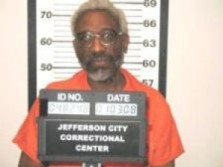Never be a Black Criminal Defendant: Despite Judicial Finding that DA Suppressed Evidence of Innocence, White Prosecutors Appeal Black Man's Voided Murder Conviction
 In photo, Missouri Attorney General Chris Koster, a white man who practices racism. [MORE] From [HERE] Prosecutors decided Wednesday not to put George Allen back on trial for a 1982 murder, but hours later the Missouri attorney general’s office said it would appeal a judge’s ruling that overturned Allen’s conviction. The state also is asking for an emergency order to keep Allen, 56, in prison until the Western District of the Missouri Court of Appeals can decide the matter. There is no timeline for what happens next.
In photo, Missouri Attorney General Chris Koster, a white man who practices racism. [MORE] From [HERE] Prosecutors decided Wednesday not to put George Allen back on trial for a 1982 murder, but hours later the Missouri attorney general’s office said it would appeal a judge’s ruling that overturned Allen’s conviction. The state also is asking for an emergency order to keep Allen, 56, in prison until the Western District of the Missouri Court of Appeals can decide the matter. There is no timeline for what happens next.
“We believe the facts and circumstances of the case and the trial court’s findings should be examined by the appellate court as part of the normal safeguarding process,” the attorney general’s office said in a prepared statement. Barry Scheck of The Innocence Project, which took on Allen’s case along with the Bryan Cave law firm in St. Louis, called the attorney general’s move “disgraceful.”
 “This is an overwhelming case of suppression of exculpatory evidence of actual innocence, (plus) a clearly false confession taken from a mentally disturbed person,” Scheck said. “The appeal is wholly without merit and just cruel.”
“This is an overwhelming case of suppression of exculpatory evidence of actual innocence, (plus) a clearly false confession taken from a mentally disturbed person,” Scheck said. “The appeal is wholly without merit and just cruel.”
In a 75-page ruling on Friday, Cole County Circuit Judge Daniel Green voided Allen’s convictions for murder, rape, sodomy and first-degree burglary in the killing of 31-year-old Mary Bell. She was slain Feb 4, 1982, in her apartment in the LaSalle Park neighborhood.
A hung jury voted 10-2 for Allen’s acquittal in 1983; a different jury convicted him in a retrial three months later. He was sentenced to 95 years in prison.
Green, in his ruling, said Allen’s rights to due process were violated because city police — in particular lead detective Herb Riley — failed to disclose to prosecutors evidence that was favorable to the defense. The judge said that violated disclosure requirements in the Supreme Court case Brady v. Maryland.
The judge pointed to, among other evidence, lab results and fingerprint comparisons that were never turned over, even as police used them to search for other suspects.
The judge also criticized Riley for using threats and leading questions in a “deeply flawed” interrogation, resulting in a “dubious” confession.
“The undisclosed evidence, considered together, points unavoidably to the conclusion that the police — and Detective Riley in particular — ignored and hid evidence pointing to someone else as the perpetrator in their zealous pursuit of Allen’s conviction,” the judge wrote.
He gave St. Louis Circuit Attorney Jennifer Joyce 10 days to decide whether to refile charges as a fresh case. Otherwise, he ordered, Allen should be released.
Joyce’s office released a statement Wednesday saying a successful retrial of Allen’s case “would be impossible” given the passage of time. The office stated while Green’s ruling does not exonerate Allen, the failure of police to follow protocol has required his release.
Joyce pledged to work with the St. Louis police to make policy changes, if needed.
“While I believe it is critically important to respect a jury’s decision in criminal matters, I also believe it is essential that the rules of law are followed in every case by all members of law enforcement,” Joyce said in her statement. “Although this event occurred three decades ago, I believe this ruling provides an opportunity today for lessons to be learned to ensure the rights of all people are protected.”
Ed Postawko, chief warrant officer for Joyce, said in an interview that the office stands by the jury’s guilty verdict. But he said a new prosecution in the decades-old case would be difficult because witnesses have died and memories have faded.
He said Riley, who died in 1996, might have been able to answer questions that have now been raised about the police investigation and taped confession. The fingerprint technician who worked the case has also since died, he said.
“They may be questions that have very legitimate, appropriate answers, but we can’t answer those questions,” he said.
Scheck noted that he and the other lawyers had presented evidence of actual innocence to Green, but ultimately decided to proceed just on the Brady argument, which they felt was strong enough alone.
He said lawyers for the attorney general had indicated that narrowing the argument would be the best way to avoid a drawn-out, unnecessary appeal.
“That’s why I’m so disappointed,” he said. “We were trying to narrow it legally so the man who’s been in 30 years can get out.”
Friends and family of Allen, who were ecstatic over Green’s ruling Friday, found themselves once again frustrated.
“This man was wrongfully convicted, and that’s what the evidence shows,” said Tom Block, who met Allen 15 years ago as a prison minister and shared his story with lawyers.